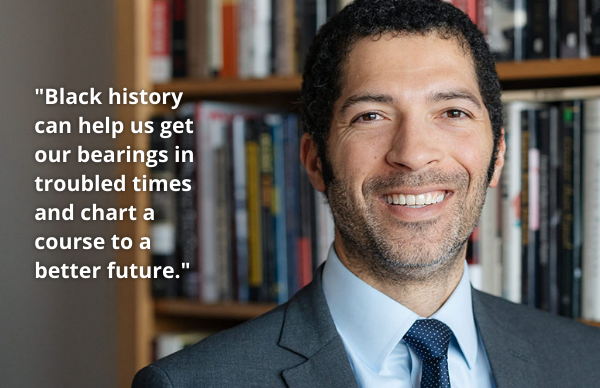Every year our clients book speakers to address their employees, students, and community members during Black History Month. But why only in February?
We spoke to PRHSB-speaker Dr. Matthew Delmont about his fresh approach to Black history, and how to celebrate it all year round.
Dr. Delmont is a Guggenheim Fellow and the Sherman Fairchild Distinguished Professor of History at Dartmouth College. An expert on African American History, he is the author of Black Quotidian: Everyday History in African American Newspapers and the upcoming Half American: The Epic Story of African Americans Fighting World War II at Home and Abroad (2022).
How can our clients ensure they are doing meaningful and fresh programming around Black history?
Corporate America has celebrated Black History Month since 1976, when President Ford officially recognized the event during the bicentennial—that was more than four decades ago! Companies and organizations plan a lot of well-intentioned Black History Month events each February, but it is easy for this programming to grow stale or feel perfunctory—and employees can tell when their company is just going through the motions. One way to ensure that this programming is meaningful and fresh is to not limit it to February. This has always been the goal of Black History Month. When Carter G. Woodson started Negro History Week in 1926, he selected the second week of February because it aligned with the birthdays of Abraham Lincoln and Frederick Douglass, but he never intended for it to be restricted to February. He thought Black history should be studied and celebrated year-round. He felt the stories that were illuminated each February were still vitally important in June, September, and December.
The same thing is true today. Companies are being asked to demonstrate their values through actions, not just words. One way to do this is by weaving the spirit of Black History Month through programing that takes place regularly across the year. If DEI work is truly going to be at the core of an organization, rather than on the margins, you have to make it part of the regular day-to-day life of your organization, not just something you embrace during moments of crisis. And you can’t really do meaningful DEI work without understanding how we got to where we are today. Black history can help us get our bearings in troubled times and chart a course to a better future.
Juneteenth (June 19 commemorates the end of slavery in the United States) has recently been declared a federal holiday. How does this day fit into our country’s larger moment of reckoning and how can we best celebrate it?
Juneteenth is a joyous celebration that encourages us to tell a fuller and more truthful story of American history. This means that we have to reckon honestly with the history and legacies of slavery and generations of racial discrimination that Black Americans have experienced. When Black Texans gathered on June 19th in the years after the Civil War, they were celebrating Emancipation, but they were also asking a very basic question, “is what we are living through right now actually freedom?” Many Black Americans are asking the same question today in the midst of racial violence and attacks on voting rights. Juneteenth reminds us that emancipation and freedom were not just words on paper, but values that were only meaningful if they could be experienced in real life. Juneteenth should inspire us to be honest about history, to make space in our lives for joy, and to be bold enough to choose the futures to which we aspire.
After lectures at companies and organizations, you are often asked: “Why didn’t I learn this in school?” Do we need a new approach to teaching Black history?
Yes! Like any professional field, history is constantly being reshaped by cutting-edge research based on new evidence, data, and interpretations of the past. If you graduated from high school or college more than a decade ago, you would be surprised at how many amazing stories, people, and events from Black history there are to share that were not in your textbooks. Thanks to the success of Black History Month, almost every American knows some basic facts about Rosa Parks and Martin Luther King, Jr., but this is only the tip of the iceberg. In the past several years, scholars have uncovered a lot of new information about these iconic figures, and more importantly, there are thousands of hidden figures in African American history who deserve to be better known. I love sharing these stories with audiences, both because it introduces them to some of the lesser-known musicians, civil rights activists, business pioneers, and athletes who have shaped America, and also because it helps people understand that history is always evolving.
Contact us for more information about booking one of our Black history speakers for your next event.
